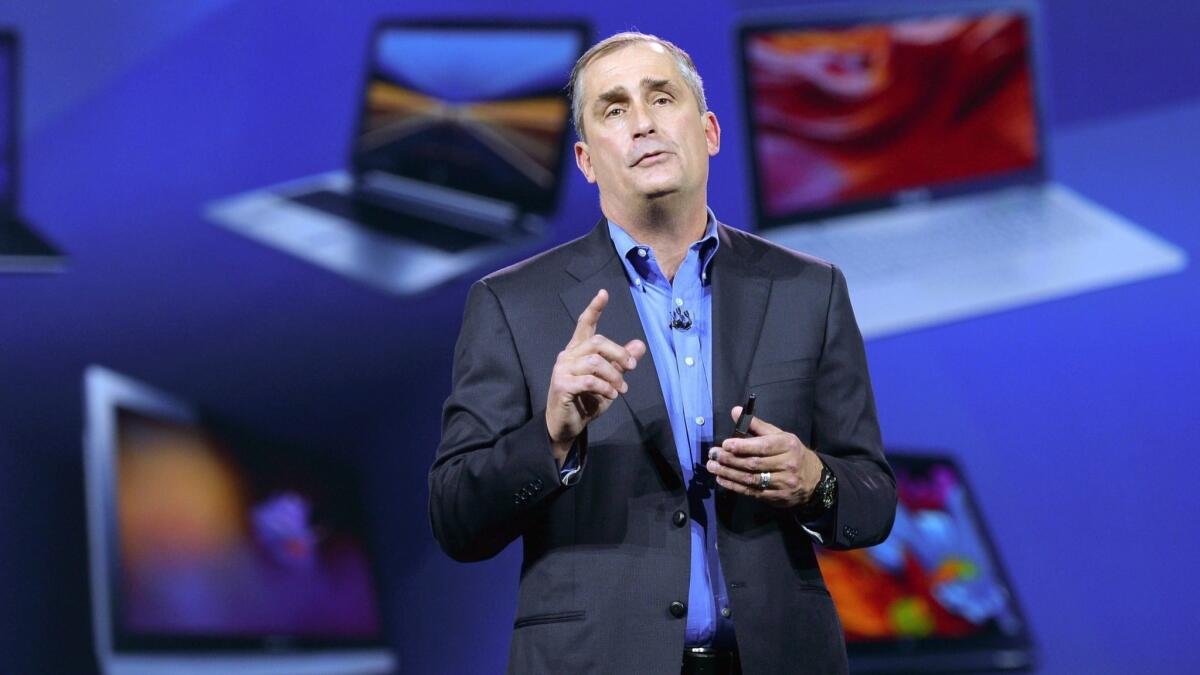Intel CEO Brian Krzanich resigns over relationship with employee

Brian Krzanich abruptly resigned as chief executive of Intel Corp. on Thursday after the giant chip maker found that he had a past consensual relationship with an Intel employee that violated the company’s policies.
Robert Swan, Intel’s chief financial officer, was named interim CEO while the company searches for a permanent chief executive.
Intel said it was “recently informed” that Krzanich had the relationship and, after an internal investigation, it “confirmed a violation of Intel’s non-fraternization policy, which applies to all managers.”
“Given the expectation that all employees will respect Intel’s values and adhere to the company’s code of conduct, the board has accepted Mr. Krzanich’s resignation,” the Santa Clara-based company said.
The employee was not identified, nor did Intel say when the relationship occurred. Intel declined to elaborate on the matter. Krzanich could not be immediately reached for comment.
Krzanich’s departure underlined how major corporations are taking a stricter stance toward office romances involving executives rather than merely discouraging them. That’s evident in Intel having an established code of conduct for such relationships.
His resignation follows the departures of other corporate CEOs over the years due either to code-of-conduct violations or, more recently, allegations of sexual misconduct amid the #MeToo movement.
In 2010, for example, Mark Hurd resigned as CEO of Hewlett-Packard Co. after a probe of his relationship with a female contractor found he violated the company’s business standards. Hurd promptly joined rival tech giant Oracle Corp., where he is now chief executive.
Guess Inc. Chairman Paul Marciano early this year gave up his day-to-day duties at the Los Angeles apparel company he co-founded after he was accused of sexual harassment, which Marciano denied.
And Las Vegas hotel-casino mogul Steve Wynn resigned as CEO of Wynn Resorts in February amid sexual misconduct allegations.
A career Intel employee, Krzanich, 58, had been chief executive since May 2013 and was leading Intel’s effort to shift from being mainly a producer of microprocessors for personal computers to providing more chips for other applications, including mobile computing, commercial drones and autonomous driving.
Intel, which is celebrating its 50th anniversary this year, had record revenue of $62.8 billion last year and employs about 102,700 people worldwide.
Intel on Thursday also raised its financial guidance for the company’s performance this year and said it “expects 2018 to be another record year.”
Intel’s stock – one of the 30 stocks in the Dow Jones industrial average – has soared 53% in the last 12 months, though it fell 2.3% to $52.24 a share in midday trading Thursday after the Krzanich announcement.
“The board believes strongly in Intel’s strategy and we are confident in Bob Swan’s ability to lead the company as we conduct a robust search for our next CEO,” Intel Chairman Andy Bryant said in a statement.
Angelo Zino, an analyst with CFRA Research, maintained his “buy” recommendation on Intel’s stock despite Krzanich’s departure.
“While we view the news of former CEO Brian Krzanich as unfortunate, we believe the company is in good hands with Robert Swan and given the progress already made towards transitioning [Intel] into a data-centric company,” Zino said in a note to clients.
Krzanich had drawn plaudits for putting Intel on a broader strategic path beyond its dominance in the manufacture of microchips that power personal computers and servers, a shift described as Intel moving from a “PC-centric company to a data-centric company” by making processors and other chips for a variety of uses.
For example, Intel is pushing hard into the driverless-vehicle industry, where among other things it makes chips for instantly processing sensor data that help navigate the vehicle. Intel also has moved into technologies such as 5G mobile communications and artificial intelligence, and into the commercial drone business.
Krzanich also had campaigned for more workplace diversity and an end to gender pay gaps at Intel and at other companies. He tweeted last month, for instance, “We need inclusion now. Every voice matters regardless of race, gender or sexual orientation.”
On April 10, which was Equal Pay Day, Krzanich said in a tweet, “Everyone deserves the same pay for the same work.. let’s all work together to make this day simply go away.”
Still, Krzanich’s strategic moves and his embracing of diversity and women’s issues didn’t insulate him when his relationship came to light.
Corporate boards overall are increasingly less tolerant of CEOs’ improper behavior. The number of U.S. chief executives ousted for ethical lapses more than doubled in the five years spanning 2012 to 2016 compared with the previous five years, according to a study of 2,500 companies by consultant PwC.
The data showed 14 CEOs were ousted for ethical lapses from 2012 to 2016 versus six the previous five years. The executives were dismissed both for their own improper conduct or that of employees reporting to them.
Bloomberg contributed to this report.
UPDATES:
10:45 a.m.: This article was updated with details about Intel’s strategy, an analyst’s comment, an updated stock price and examples of other CEOs who were ousted for inappropriate behavior.
7:35 a.m.: This article was updated throughout with staff reporting and additional details about Krzanich and Intel.
This article was originally published at 6:30 a.m.
More to Read
Inside the business of entertainment
The Wide Shot brings you news, analysis and insights on everything from streaming wars to production — and what it all means for the future.
You may occasionally receive promotional content from the Los Angeles Times.











